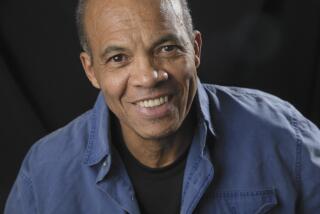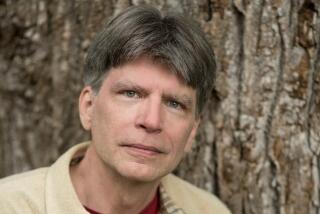It’s Still Iceland, No Matter What It’s Called : THE FRIENDS OF FREELAND by Brad Leithauser; Alfred A. Knopf $26, 505 pages
The novice writer strides from the office of the publisher who has just accepted two of his manuscripts. The city belongs to me, he tells himself, pacing its streets in a flush of glory.
But what a city: rows of corrugated metal houses along the sub-Arctic waterfront, an old stone church, a pokey hotel, two or three mediocre restaurants. He comes to the harborside square where an old lounger asks after his aunt and offers him part of his snack of dried fish softened with butter.
The city is Thorkrist, capital of Freeland, but in most important respects it is Reykjavik, capital of Iceland. Brad Leithauser spent two years there. “I’ve tried hard here to do something more than merely portray that magnificent, puzzling nation under a funny name,” he writes in an introductory note.
In fact, the “more” in his sprawling novel is unconvincing. It bloats and blurs its arresting, memorable “less”: the evocation of an island country with a unique political, social and literary culture and an isolation both willed and chafed under, both limiting and enhancing.
Like other Western writers who spend time in Iceland (W.H. Auden was one), Leithauser is seared by two contradictory illuminations: Here are the wellsprings of our own time- and travel-stained culture--and in how tiny a space they flow. The world of literary glory that opens to Eggert, the aspiring novelist, extends no farther than the fish-munching gaffer who, like most everyone else in Freeland, knows him and his aunt both.
In an on-and-off, hop-skip fashion, “The Friends of Freeland” tells the saga--appropriate word, in view of Iceland’s particular contribution to Western literature--of Hannibal. Freeland’s president for 20 years, he is the passionate upholder of its cultural and social uniqueness against the contamination from “Down Under,” i.e. the United States and Europe.
As in Iceland, the language is a kind of Old Norse, essentially unchanged for hundreds of years. A language commission painfully works to find traditional words for modern things (an Icelandic television screen, grayish and translucent, goes by the name for a sheep’s placenta). There are no last names: men and women bear their fathers’ first names plus “son” or “dottir,” respectively. The radio must broadcast a large quota of music written or performed by Freelanders.
Which makes the young people, who have little to do at night except go to a few shabby discotheques and mill about afterward drinking, indignant. One young woman, objecting to a radio diet of bad Freeland imitations of Madonna and Mick Jagger, notes that, in fact, the radio stations tend to play their “native” quotas at hours when nobody is listening.
Hannibal, a visionary who draws inspiration from the island’s volcanoes and lava-covered landscape--”gray is to Freeland as green is to Ireland”--is trying to run for another term. He is opposed by the young and by farmers, fishermen and businessmen who feel it is time to modify the island’s splendid difference. Two American campaign strategists are brought in for the opposing candidate; Leithauser has some fairly obvious fun with their polls and dirty tricks.
Hannibal’s story is told by Eggert, now Freeland’s most eminent writer and the president’s old friend and campaign aide. He gives long accounts of himself, as well; notably three drawn-out and detailed love affairs. For Hannibal, his feelings seem to range from argumentative loyalty to reverence.
Eggert is immensely wordy, diffuse and rambling. For example, when he tells of sneaking in as a boy to see “Top Hat,” he spends four pages recounting the movie in minute detail. He is not so much a narrator as a kind of narrative clearinghouse; he has crept into Leithauser’s word processor and loaded it with everything that occurs to him: reflections, speeches, stories loosely cobbled together.
“Friends” works best when Leithauser turns from novelizing and uses his gifts as poet and essayist to evoke Freeland / Iceland and the paradoxes of its society and culture. Hannibal, a shambling but winning figure, gets no special privileges as president, and has to scavenge for discarded crates and cardboard to warm his house. (Some years ago, Leithauser wrote about seeing Iceland’s former president, Vigdis Finnbogadottir, helping to dig a neighbor’s car out of a snowdrift.)
Hannibal’s battle to retain Freeland’s special ways comes out in a balance between victory and defeat. It is a balance that shifts and roils like the tides of molten volcanic stone that periodically erupt through the island’s skin, and that constitute, the author writes, “its true sea.” He describes November as “that exquisite time of year when the full Arctic dark is coming down and the sun, so low to the horizon, becomes just another scrawny hovel-dweller, shivering in its bed of ragged red clouds.”
Character, landscape, weather--Leithauser has fitted them together in a distinguished and moving national portrait that survives, sometimes barely, the fictional gyrations that surround it.
More to Read
Sign up for our Book Club newsletter
Get the latest news, events and more from the Los Angeles Times Book Club, and help us get L.A. reading and talking.
You may occasionally receive promotional content from the Los Angeles Times.






